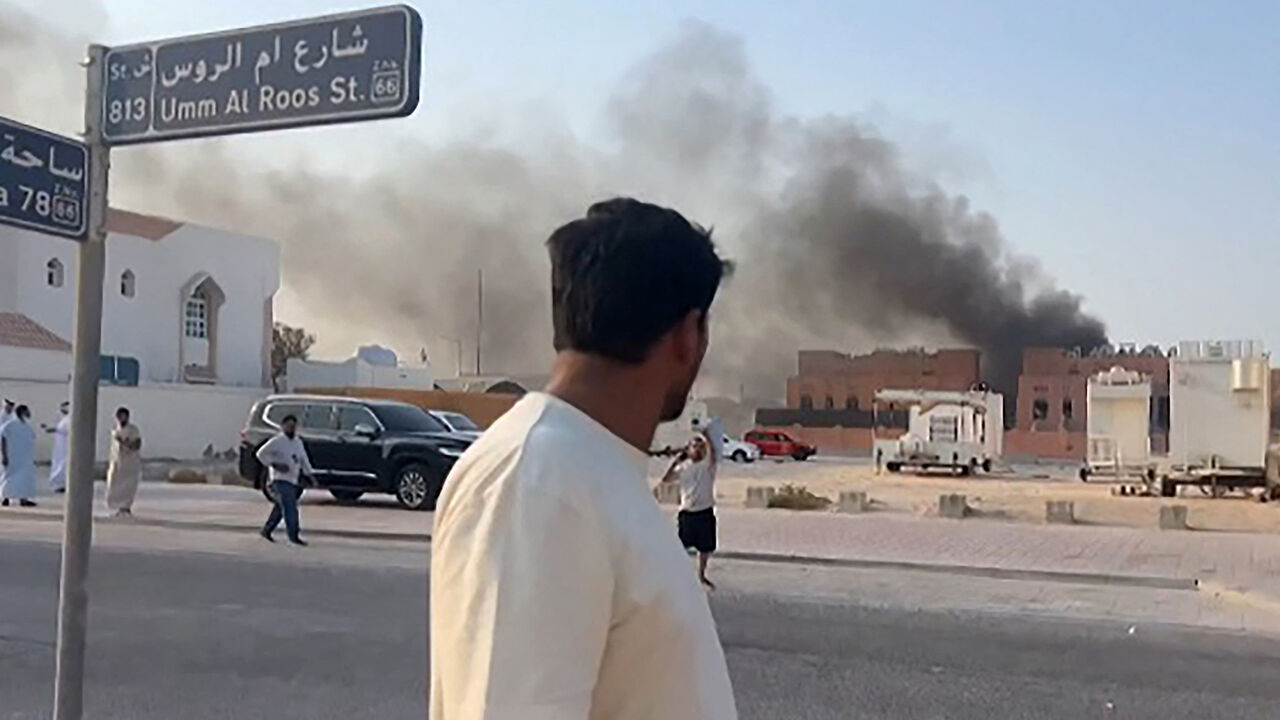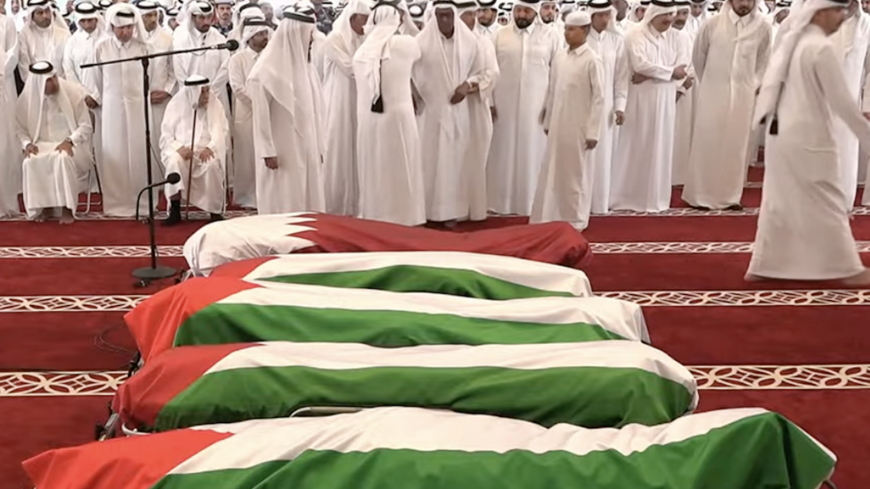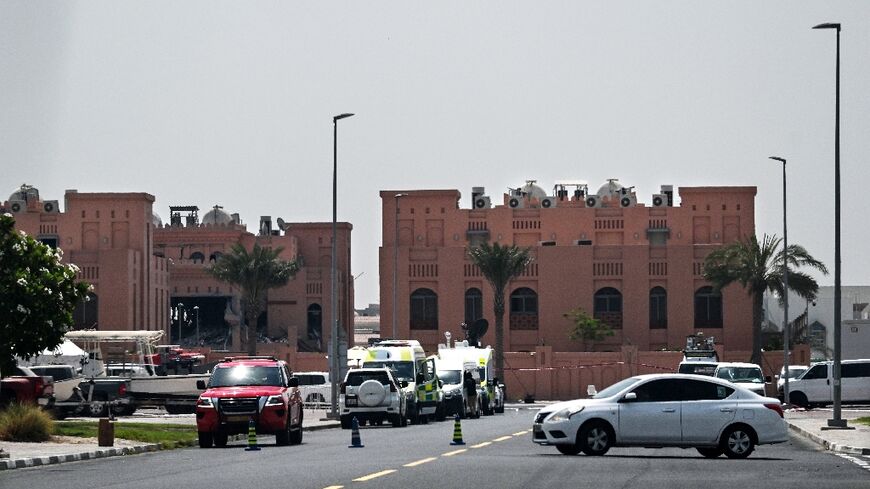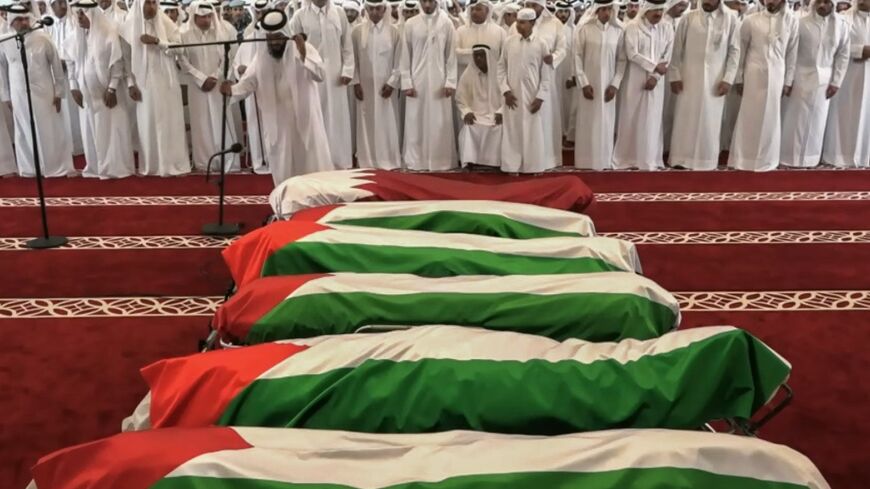Israeli airstrikes target Hamas leadership in Qatar's Doha
The strikes come just a day after Qatari authorities engaged with Hamas officials to press for a response to a US-backed ceasefire and hostage exchange proposal.

Israel struck the Qatari capital of Doha on Tuesday, targeting Hamas’ leadership amid ongoing ceasefire talks.
Following reports of the strikes, the Israeli military released a statement saying that in collaboration with the Shin Bet, it had “conducted a targeted strike a short while ago against the top leadership of the Hamas terrorist organization.”
Those attacked “had led the terrorist organization's activities for years and are directly responsible for carrying out the Oct. 7 massacre and managing the war against the State of Israel,” the military’s statement read.
The military added that it had taken steps to minimize harm to civilians ahead of the attack, “including the use of precision weaponry and additional intelligence information.”
Israeli media has reported that Israel's fighter jets dropped 10 bombs during its strikes on Doha. According to Israeli broadcaster Kan, the targets included Khalil al-Hayya, the acting chairman of Hamas’ political bureau. A number of other Hamas leaders are based in Doha, including Khaled Meshaal.
Al-Arabiya’s Arabic broadcast showed smoke rising from a building in Doha. Israeli journalists shared purported images of the strikes' aftermath on social media.
Hamas claims strikes unsuccessful
🚨🚨🚨 Israeli Air Force fighter jets attacked Hamas leaders at the official headquarters in Doha, Qatar. pic.twitter.com/33gAgo4XGJ
— Amichai Stein (@AmichaiStein1) September 9, 2025
Qatari Foreign Ministry spokesperson Majed al-Ansari condemned what he called the "cowardly Israeli attack," saying in a post on X that the strikes "targeted residential buildings housing several members of the Political Bureau of Hamas" in Doha.
Speaking about the latest update on a ceasefire deal, a Qatari Embassy official in Washington told Al-Monitor, “Hamas received the new proposal from us, which we obtained from [US envoy Steve] Witkoff last week in Paris. The prime minister met with them yesterday. They decided to meet again today to discuss the proposal, arriving from [abroad]. However, as has happened before, the Israelis undermined hopes for peace, further prolonging the war and complicating efforts to bring back the hostages."
Over 8,000 US troops are stationed at Al Udeid Air Base in Qatar, the largest American military installation in the Middle East and the regional headquarters of US Central Command. In late June, Tehran fired missiles at the base in retaliation for US strikes on Iranian nuclear sites. The attack caused no casualties but prompted a sharp condemnation from Qatar’s Foreign Ministry.
A Pentagon official told Al-Monitor, “We are aware of the reports about the Israeli strikes in Doha today. US forces did not participate in the strikes and we refer you to the IDF for any additional information.”
Israel’s latest strikes come just a day after Qatari authorities met with Hamas officials to press for the militant group to respond positively to a US-backed ceasefire and hostage-exchange deal. Israel said on Monday it had accepted the outline.
On Sunday, Hamas said in a statement that it was ready to “immediately sit at the negotiating table” after it received “some ideas from the American side aimed at reaching a ceasefire.”
Hamas’ statement came after Trump issued what he called his “last warning” to the militant group. "The Israelis have accepted my terms. It is time for Hamas to accept as well,” Trump wrote on Truth Social. “I have warned Hamas about the consequences of not accepting."
Israel has targeted a number of Hamas leaders since the Gaza war began, but Tuesday’s strikes mark the first time the country has hit the group’s members in Qatar. Last July, Israel assassinated Hamas political chief Ismail Haniyeh in Tehran. In October, Hamas leader Yahya Sinwar was killed in a firefight with Israeli forces in Gaza. Sinwar had been serving as Hamas’ military and political leader at the time of his death and was deemed the mastermind of the Oct. 7 attack on southern Israel.
CENTCOM commander Adm. Brad Cooper was in Israel over the weekend and met with the Israeli military’s chief of staff, Eyal Zamir, who gave him an “operational situational assessment,” according to the Israeli military. They met at Israeli military base Camp Rabin and toured communities surrounding Gaza.
Israel says military acted alone
A statement from Israeli Prime Minister Benjamin Netanyahu's office on Tuesday said that the strikes were "a wholly independent Israeli operation."
"Israel initiated it, Israel conducted it, and Israel takes full accountability," the statement read.
Speaking at an event at the US Embassy in Jerusalem later on Tuesday, Netanyahu confirmed that he authorized strikes against the "terror chiefs of Hamas" but did not offer any indication of whether the militant leaders were killed. Netanyahu added that Israel acted "wholly independently" in the strikes.
Netanyahu said in the speech that Israel has accepted Trump's terms for a deal on a Gaza ceasefire and hostage release.
Citing US officials, Axios reported that Israel notified President Donald Trump's administration just before it struck Doha.
White House Press Secretary Karoline Leavitt read a statement to reporters on Tuesday in which the US president criticized the location of the strikes but backed the targeting of Hamas leaders.
“Unilaterally bombing inside Qatar, a sovereign nation and close ally of the United States, that is working very hard and bravely taking risks with us to broker peace, does not advance Israel or America’s goals,” she read. “However, eliminating Hamas, who have profited off the misery of those living in Gaza, is a worthy goal.”
The US military informed the US administration of the strikes and the United States informed Qatar, she said. Trump then spoke to both Netanyahu and Qatari Emir Sheikh Tamim bin Hamad Al Thani afterward. Trump said that Netanyahu “wants to make peace" and assured Doha that “such a thing will not happen again on their soil.”
“President Trump believes this unfortunate incident could serve as an opportunity for peace,” the statement read.
Qatari Prime Minister and Foreign Minister Sheikh Mohammed bin Abdulrahman bin Jassim Al Thani told reporters after the strikes on Tuesday that Trump "condemned" the attack in a call with the emir and said the United States had no knowledge of the strikes until they "started to happen."
The prime minister said Qatar has been committed to mediating a ceasefire in Gaza, but clarified that the status of the negotiations is now unclear."When it comes to the current talks, I don't think there is something valid right now after seeing such an attack," he said.
Qatar is a major non-NATO ally of the United States, and its leadership enjoys friendly relations with Trump, having hosted him for an official visit in May.
Turkey, which hosts some of Hamas’ political leaders, condemned Israel’s attack on the Hamas negotiation delegation in Doha, Qatar, saying that the strikes were “clear evidence of Israeli expansionist policies.”
Turkey, a NATO member, does not recognize Hamas as a terrorist organization. The group’s political leaders split their time between Turkey and Qatar.
This developing story has been updated since initial publication. Jared Szuba contributed to this report.





